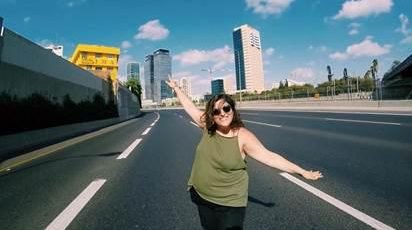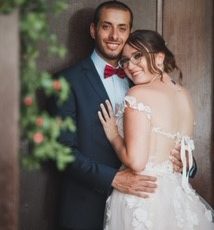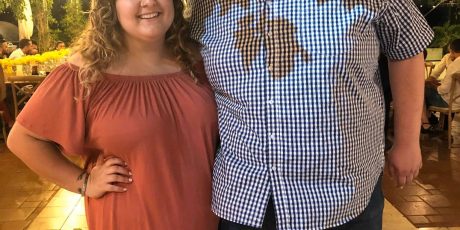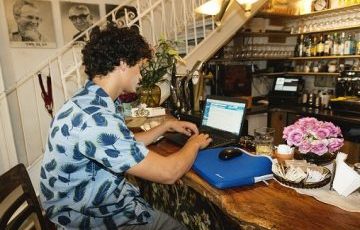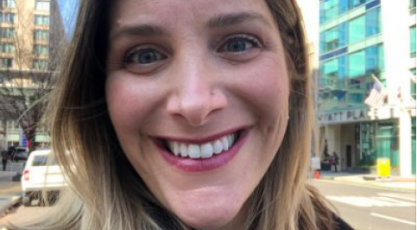By Ariel Rubinstein
How does a self-hating Jewish Israeli American go from cursing at the sight of anything Jewish or Israel related to volunteering for a year in Israel? I don’t really know how it happened, but that’s my story.
I grew up in an Israeli household in Las Vegas and I didn’t have many positive interactions with my Judaism or Israeli heritage. In Sunday school I felt that my age and gender held me back because I believed that I was already at a higher level. I’d sit in the class and cause any disruption that I could come up with; it came to the point where I stopped going and just watched morning cartoons while I waited for my siblings to return. I would stay home for Yom Kippur and (I pray my mother never sees this) sneak food and water to my room before the fast and play video games under the covers, but when the fast was over I’d pretend that I had fasted and enjoy going out to eat with my family.
Being Jewish made it a bit hard to be around my peers; they clearly knew that I was Jewish by my lack of knowledge of Christian traditions, making the holidays a hard time. There was even a time in middle school where kids started drawing swastikas on the ground by the bus stop I went to, a small project I had done for class was returned with the word “Jew” scribbled on it, and I had a meeting with the Dean because it had gotten to the point where my mom had to intervene. I had enough and wished I could have shed that part of myself. It didn’t help that on TV I constantly saw all the conflict happening in Israel; crazy religious people spitting and throwing rocks at secular women, bombs going off, and terrorists running wild. I would freak out when my parents would go back to visit their old home. Why would I want to be part of that? What kid wants to be part of the worry and stress and fear that comes from being Jewish, from being Israeli?
But after I started college something strange happened. I slowly got sucked into seeing everything in a better light with Chabad on Campus and Hillel. It began with my sister dragging me to Parsha learning, Shabbat meals, and other events (only for the free food, of course) and eventually developed into learning to read Hebrew again with my rabbi, coming early to help cook for those Shabbat meals, and to set up for all these events.
Just as I began having some positive Jewish experiences I was confronted with the second half of my uncomfortable identity-the Israeli part. Fearing the funds would soon run out, my mom forced me to go on a Birthright trip. It wasn’t encouraging that there were terrorist attacks after I had been accepted for the trip, bad enough that they offered the option of a full refund for those who changed their minds in light of the escalating situation. It didn’t help that I had to go with my Israeli passport and my army exemption paper so that I wouldn’t be drafted into the IDF upon arrival. However being stuck for 10 days in what I saw as such a scary country, far from what I felt was home, ended up being the point of no return for me. During those 10 days not only did I get to see the positives of being a Jewish Israeli American and how safe the country really is despite what I saw on TV, but now I was seeing the beauty of it all in the only Jewish state in the world. This was something truly amazing.
I knew I had to do anything I could to return, so I did three trips back to back during every major break from school, but it wasn’t enough to be there for two weeks and go back to the states. After some research I discovered a solution to this problem, a fulfillment to this craving for more Israel. I found Masa Israel Teaching Fellows, a 10 month program teaching English in Israel. Unfortunately it wasn’t as simple as it seemed. I needed to graduate first and with my double-major, it would take me an additional two years to finish. I simply couldn’t wait that long. I ended up dropping my education major after 3.5 years and finished only my Spanish degree so that I could to teach English to Israeli school children, and I haven’t looked back.
After eight full months, and this is about to sound really cheesy, I feel like a whole new person. Far gone is the newness of being in Israel, the embarrassment of speaking in broken Hebrew, the impetuous reasons for making aliyah and wanting to join the army are gone, most places in the country have already been explored, and falafel and shwarma aren’t the go to meals. So what does that mean? I have become acclimated into the daily life here, the politics and daily problems aren’t as covered up, and my motivation to learn Hebrew is far from what it was like when I was at school. Whenever I feel like my Hebrew isn’t up to snuff and ask if said person speaks English (most times not) they ask me why I would ask in the first place because my Hebrew is surprisingly good for an American. It means I understand why I want to make aliyah and join the army, most places may have been explored, but now there’s traveling to be had without the big groups and with all my prior knowledge, and I may not go straight to the falafel and shwarma, but that’s because I have found different tasty treats that Israel has to offer because how can you turn down a potato boureka from a five shekel stand and pick up a watermelon ice cream after? I know I can’t. What I can know is Israel is a place I can call home.


